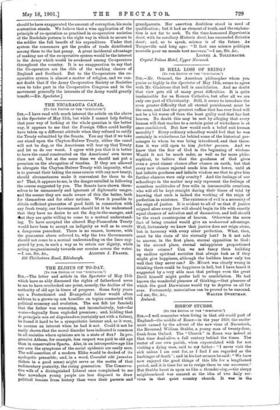THE ELIHUS OF TO-DAY.
[TO THE EDITOR OF TILE "SPECTATOR."]
SIR,—The letter and article in the Spectator of May 11th which have so ably discussed the rights of fatherhood seem to me to have overlooked one point, namely, the decline of the authority of old age in times of progress. Some forty years ago a Protectionist and Evangelical father would often address to a grown-up son homilies on topics connected with political economy and evolution. The son felt (or fancied) that the father was reasoning, not inconclusively, but—far worse—logically from exploded premises ; and, holding that de principiis non. eat clisputandum (certainly not with a father), he found it hard to be a sympathetic listener and, as it were, to assume an interest when he had it not. Could it not be easily shown that the moral disorder here indicated is common in all societies where opinions are in a state of flux? In pro. gressive Athens, for example, less respect was paid to old age than in conservative Sparta. Also, in an introspective age like our own the symptoms of the social epidemic are easily seen. The self-assertion of a modern Elihu would be docked of its apologetic preamble; and, in a word, Consult sibi juventus (taken in a good sense) might serve as the motto of that rudimentary posterity, the rising generation. The Conserva- tive wife of a distinguished Liberal once complained to me that nowadays young people are less disposed to draw politic& lessons from history than were their parents and grandparents. Her assertion doubtless stood in need of qualification ; but it had an element of truth, and the explana- tion is not far to seek. To the time-honoured Experientia docet, with its corollary Historia docet, has succeeded Scientia docet; and, so to speak, science is of the future. As Tocqueville said long ago : "II faut une science politique nouvelle pour un monde tout nouveau."—I am, Sir, &c., LioNEL A. TOLLEMACHE.
Crystal Palace Hotel, Upper Norwood.






































 Previous page
Previous page